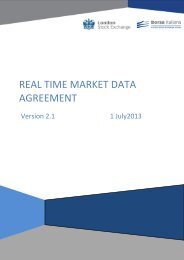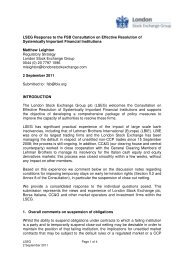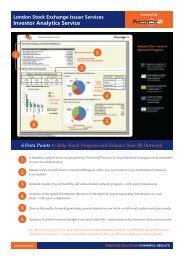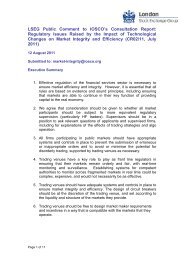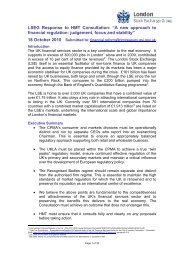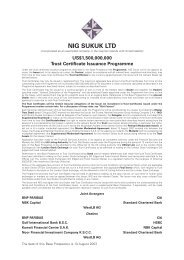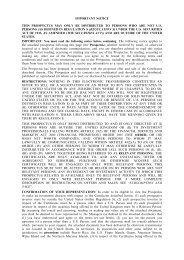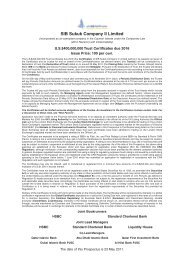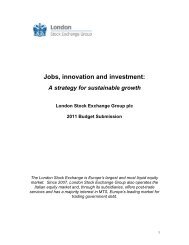I. High frequency trading (HFT) - London Stock Exchange
I. High frequency trading (HFT) - London Stock Exchange
I. High frequency trading (HFT) - London Stock Exchange
Create successful ePaper yourself
Turn your PDF publications into a flip-book with our unique Google optimized e-Paper software.
associated with executing a trade on the market or system of a venue. Not only<br />
do co-location services facilitate the provision of liquidity, but they make markets<br />
more efficient generally as part of the evolution to more competitive markets; we<br />
suggest that clients and investors benefit from the fact that price formation is<br />
more efficient, there are tighter spreads and a better correlation of prices<br />
amongst related securities.<br />
2. Are there any downsides arising from the provision of co-location<br />
services If yes, please describe them.<br />
In general, some commentators raise the question of fair access, if the venue<br />
has only a finite amount of physical space, how will they allocate co-location<br />
racks to their potential customers We do not see this as a problem as long as<br />
venues have appropriate procedures in place. To date the LSE has allocated<br />
cabinets on a ’first come, first served' basis to Trading Participants to ensure<br />
fairness and equal opportunity. The <strong>Exchange</strong> will seek to continue to<br />
utilise space within its data centre to meet future clients’ needs.<br />
See also our response to question 5, below.<br />
3. What impact do co-location services have on <strong>trading</strong> platforms,<br />
participants, and the wider market<br />
Co-location services reduce access latency and network latency and have a<br />
positive impact on the overall latency associated with executing a trade on a<br />
venue’s market. Reduced latency has the effects outlined in Section I (<strong>HFT</strong>) of<br />
this paper.<br />
4. Does the latency benefit for firms using co-location services create any<br />
issues for the fairness and efficiency of markets<br />
Co-location is seen by some to provide certain participants with a technological<br />
advantage that others may not have. Our position is that the service terms are<br />
transparent, available to all market participants and the pricing is also transparent<br />
and non-discriminatory. The location of the technology does not have an effect<br />
on the controls that must be put in place by firms.<br />
Provided that all other venues ensure they have procedures in place to ensure<br />
fairness and equal opportunity, we do not believe there should be cause for<br />
concern.<br />
5. In your view, do co-location services create an issue with the MiFID<br />
obligations on <strong>trading</strong> platforms to provide for fair access<br />
As per the response to question 4, our position is that if the service is offered and<br />
available to participants on a fair and equal basis, then fair access is available to<br />
all interested parties.<br />
In any case, in our view, the responsibility of a venue to provide fair access<br />
arises only when the orders arrive at the <strong>trading</strong> system. Members are located in<br />
13



